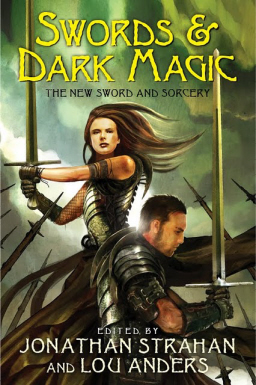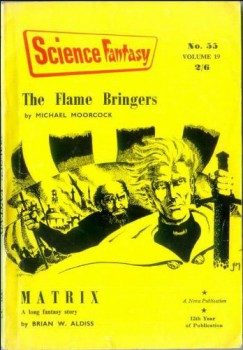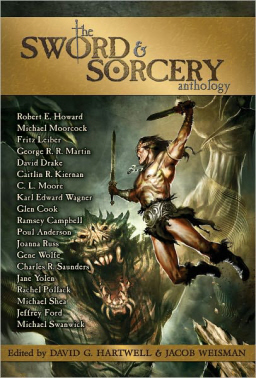Law vs. Chaos replaces Good vs. Evil?
 Jonathan Strahan and Lou Anders dedicate their sword and sorcery anthology Swords and Dark Magic to Robert E. Howard, Fritz Leiber, and Michael Moorcock as “the great literary swordsmen who made it possible.” Creating one of the most memorable characters in the genre — the “anti-hero” of Elric of Melniboné — would be enough to earn Moorcock this acknowledgment. But Strahan and Anders suggest that:
Jonathan Strahan and Lou Anders dedicate their sword and sorcery anthology Swords and Dark Magic to Robert E. Howard, Fritz Leiber, and Michael Moorcock as “the great literary swordsmen who made it possible.” Creating one of the most memorable characters in the genre — the “anti-hero” of Elric of Melniboné — would be enough to earn Moorcock this acknowledgment. But Strahan and Anders suggest that:
It might be his alteration of the battle of Good versus Evil into that of Law versus Chaos (with disastrous consequences implied if either side ultimately triumphed over the other) that made the most significant contribution to fantasy literature (p. xv).
For those who may be unfamiliar with this distinction, Moorcock’s fantasy universe (or multi-verse) is populated, and seemingly controlled to some extent, by the Lords of Law and the Lords of Chaos. These god-like beings seemingly have mysterious and unfathomable intentions.
But they often appear to desire to exert their Lawful or Chaotic control over mortals and their worlds. As Strahan and Anders note, results are calamitous for any such world and its inhabitants when the scale tips too far towards either Law or Chaos.
No doubt this “alteration” has been significant. Outside the realm of fantasy literature, Moorcock’s Law versus Chaos contrast is most notably seen in the early Dungeons and Dragons rules. Its famous notion of alignment spawned a whole cosmological picture upon which this historically important game was built. (See Appendix 1 “The Known Planes of Existence” in Deities and Demigods.)
Nevertheless, I disagree with Strahan and Anders’s wording of this LC contrast. They seem to suggest — and they are not the first to do so — that Moorcock’s LC is a replacement of the traditional Good versus Evil dynamic within his famous sword and sorcery tales.
I want to suggest that it is rather an added facet. I’ll look at just one of Moorcock’s famous Elric stories to make this case.
 “The Caravan of Forgotten Dreams” first appeared in the October/November 1962 issue of Science Fantasy, #55, under the title “The Flame Bringers,” but has recently been anthologized in David Hartwell and Jacob Weisman’s The Sword and Sorcery Anthology.
“The Caravan of Forgotten Dreams” first appeared in the October/November 1962 issue of Science Fantasy, #55, under the title “The Flame Bringers,” but has recently been anthologized in David Hartwell and Jacob Weisman’s The Sword and Sorcery Anthology.
In this story, Elric’s usual harried life of battle and magic has settled down for a brief period of relative peace and marital bliss in the peaceful city of Karlaak. Unfortunately, news of the coming Terarn Gashtek, the Flame Bringer, and his accompanying horde of five hundred thousand warriors interrupt this tranquility.
As if these odds were not bad enough, Terarn Gashtek has also recently enslaved the sorcerous aid of one Drinij Bara. Seeing no other possibility to save Karlaak, Elric, along with his trusty sidekick Moonglum, set out to inveigle their way into Terarn Gashtek’s horde in hopes that they can free Drinij Bara and thus employ his magical aid in stopping the Flame Bringer.
Spoilers: In short, Elric and Moonglum successfully become part of Terarn Gashtek’s horde, but their “rescue” of Drinij Bara is less than completely successful. Fortunately, Elric’s Dragon Lord cousin Dyvim Tvar saves the day with the assistance of his dragons, who incinerate Terarn Gashtek’s entire horde. This story is much more exciting than my far-too-brief summary attempts.
Again, though this story is set in a universe, or multi-verse, ruled by Law versus Chaos, we nevertheless see various moral notions (i.e. concepts that appeal to moral goodness) used throughout.
For instance, though Elric and Moonglum want to save Karlaak from the Flame Bringer, Moonglum suggests that Nadsokor, the evil City of Beggars, “deserves” to be destroyed by Terarn Gashtek.
In contrast, when Elric and Moonglum are forced to lead the Flame Bringer to a city of prey, they believe it “disgraceful to sacrifice another township to give Karlaak a few days’ grace, yet…” Both comments imply what would be morally good or morally bad in such cases.
 Similarly, though Elric is a servant of Chaos, it’s clear that we are to feel sympathetic toward him, and Moonglum, since their actions are in moral contrast to Terarn Gashtek and his horde.
Similarly, though Elric is a servant of Chaos, it’s clear that we are to feel sympathetic toward him, and Moonglum, since their actions are in moral contrast to Terarn Gashtek and his horde.
Throughout the sacking of the town of Gorjhan, while the Flame Bringer’s army does various horrible acts, Elric and Moonglum hide in order to not take part. They do several noble things like saving several women and children from death. This is especially noteworthy given that we are reminded that Elric’s race, the Melnibonéans, are a people who “loved pleasure, cruelty and sophistication for its own sake.”
When Terarn Gashtek finally falls to Elric’s demonic soul-eating sword Stormbringer, he cries: “Destroyer, I may be . . . but my way was cleaner than yours.”
The implication here is that even though Terarn Gashtek performed evil actions, there are some morally despicable things that even he was not guilty of that Elric is.
I think this story is a fair representation of Moorcock’s other Elric stories. Even though the LC is an interesting and dominant feature throughout, it does not seem to operate as a replacement of the traditional Good versus Evil contrast.
Though I don’t have the space to argue for it here, I think this is an almost necessary upshot of good sword and sorcery tales. A sense of justice seems needed (even if only subjective or personal) for satisfying story resolutions in such tales.
Elric, while an interesting character, wasn’t even the best character in the Elric stories – that would be his sword. I think the law/chaos and his presentation of the multiverse were both far more interesting additions to the genre than Elric.
I don’t see law/chaos as being a replacement either. Both claimed to be the purveyors of good but, unmoderated, both actually led to evil just as Stalinism and anarchy do in the real world. Real good is found in the middle and that is why the Eternal Champion as hero served the Balance and not Law or Chaos.
Tyr,
Interesting idea that “Real good is found in the middle” while Law and Chaos are “purveyors of good.” I think your idea here that Law and Chaos think they’re bringing about good in trying to extend their respective powers, but the actual good is balance between Law and Chaos. That makes sense in Moorcock’s multi-verse.
I’m not sure that the analogy with Stalinism or anarchism is apt though. The problems that such political ideologies brought about I think cannot be so easily explained by (not that you were suggesting that).
No disrespect to Moorcock but I think the best treatment of law vs. chaos was in Louise Cooper’s Time Master trilogy (Initiate, Outcast, Master). The sequel & prequel trilogies were less successful but still had some interesting ideas.
I note that Poul Anderson used Law and Chaos in his Three Hearts and Three Lions. Law, simply, was Good, and Chaos, Evil.
Joe,
That’s interesting to know. One wonders if Moorcock’s Law vs. Chaos dynamic has been so influential, why hasn’t it been used by other writers? Cooper seems to be one example.
Mary,
Often I think this reduction of Law to Good and Chaos to Evil is in effect in Moorcock’s books as well, though it’s not always so “on the nose.” I’d be interested in seeing how Anderson used the concepts.
Three Hearts and Three Lions is a good book. A classic of the genre.
Mary,
I know this post is from awhile back, but I just wanted to let you know that I tracked down a copy of Poul Anderson’s book and I really loved it!
You are definitely correct. Anderson seems to have used Chaos as synonymous with Evil and Law as synonymous with Good. However, he does seem to show some fuzziness about who serves Chaos or Law. Some “good” characters seem to serve Chaos, at least at times.
Interesting take. Thanks for putting me on to Anderson’s classic fantasy book!
[…] Law vs Chaos Replaces Good vs Evil […]
[…] and Jacob Weisman’s The Sword and Sorcery Anthology and Jonathan Strahan and Lou Anders’s Swords and Dark Magic.) So, when I recently stumbled across a whole book devoted to the history of fantasy, I grabbed […]
[…] When the rare new heroic fiction story collection comes along, like Strahan and Anders’ Swords & Dark Magic or Davis and Saunders’ Griots, I don’t hesitate to toss it in my Amazon […]